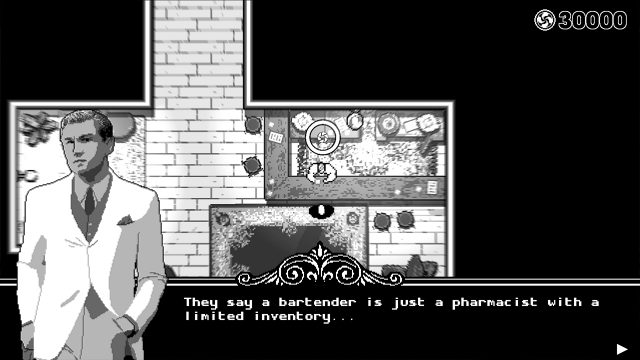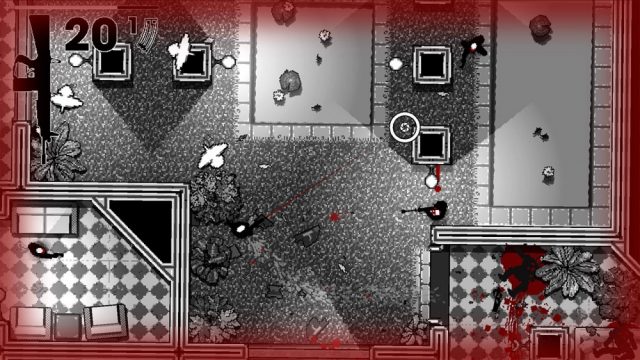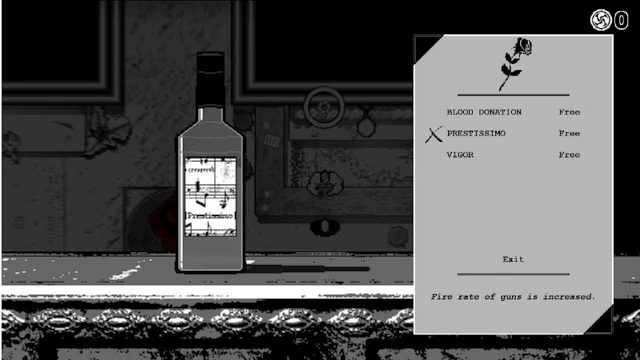Incredibly fun and addicting gameplay; rougelike elements ensure no playthrough is the same as the last; fantastic soundtrack; the mysteries of the mansion and its denizens is intriguing; the game is tough, but getting better with each run is satisfying
Drinks are too expensive to properly engage with the import mechanic; the game's lore is a little too vague and leaves the player with more questions than answers
Sometimes I run across a game that stops me in my tracks, immediately pulls me in, and refuses to let go. It may not be the most spectacle-laden nor the most visually impressive, but something about it is intriguing enough that I have to play right away — and then I can’t stop.
OTXO is one of those games.
The top-down, roguelike, twin-stick shooter from Lateralis Heavy Industries has been described to death as Hotline Miami meets John Wick, and with good reason. Having played (and loved) Hotline Miami, the gameplay similarities are obvious, but it also incorporates similar storytelling elements, including the fever dream-like state of the world and questions of what’s really happening and what’s not. Throw in over-the-top violence and gunfights reminiscent of the ones John Wick finds himself in (along with a protagonist in a sharp suit), and you’ll find the comparisons to be pretty spot-on.
However, I think it’s important to avoid relegating OTXO to merely a Hotline Miami clone and positioning it within any other game’s shadow. OTXO does some really cool, unique things that should be recognized and applauded and which help it stand on its own.
The game begins with the nameless protagonist on a train with his beloved. They’re sitting across from a lone man; when the man gets up for his stop and walks past the protagonist on his way out of the train, he throws a mask at the protagonist’s feet. The protagonist puts it on, and suddenly he’s laying face-down on a beach, alone, still wearing the mask. He quickly makes his way to the mansion just beyond the shoreline where he finds a groundskeeper, who refers to him as “another otxo” who’s washed up on their shores. The groundskeeper explains that all the otxo are the same: they were all traveling with a companion, somehow came across the mask, felt compelled to put it on, and then remember nothing before waking up in the sand.
Unfortunately for the otxo, the mask can’t be removed. It also keeps the wearer alive, so they can’t kill themselves or be killed — permanently, anyway. Every time they die, they just wind up back on the beach. If they want out of the horrifying loop, they have to reach and destroy the heart of the mansion, where their beloveds are held.
This is where things shift pretty seamlessly into the game’s tutorial, and the actions are simple: aim, shoot, roll, and kick. However, the otxo have a special ability granted to them by the mask which gives them a serious leg up against enemies: Focus. Focus enables the otxo to briefly slow time so they can dodge enemy attacks and take them out first. This is crucial, given that the gunmen patrolling the mansion all have heightened speed and senses and can take you out very quickly if you don’t get the drop on them. Focus lasts for a few seconds before needing to charge again, but the aiming cursor also doubles as the Focus meter, so it’s easy to see when Focus needs to be recharged. I loved Focus and, while I didn’t want to become too over-reliant on it and forced myself to get better without it, it was necessary for some encounters and a literal game-changer that definitely makes you feel like you have an advantage over your enemies.
Players are encouraged to take out enemies as quickly as possible to increase their combo meter. The faster you kill, the higher the combo meter climbs, and the more coin enemies drop. You’re going to want that coin to spend at the bar inside the mansion, since each drink on offer imparts a unique, beneficial effect onto the player. However, drinks are expensive and the prices continue to climb the farther you travel into the mansion, so it’s in your best interest to increase your killing speed. Bear in mind that every time you’re killed and have to start a new run, you lose all of your coin and the status effects of your drinks and begin back at the start of the mansion. While frustrating (which is the point of the game), this is an opportunity to try myriad combinations of drinks to see which effects you want to stack and which combination is best suited to your play style — and will be most effective at keeping you alive and making you more lethal.

While every run starts the player in the Infinite Foyer, the roguelike element of the game keeps things interesting by not only randomizing the order of the mansion’s rooms but their layouts, as well. No two runs will be the same, though players will have to clear all of the mansion’s rooms to reach its heart. Every section of the mansion has a boss, and the gunmen in every section have different abilities, strengths, and weaknesses. During one of my runs, the gunmen in one section were farsighted while the gunmen in another had heightened speed. Eventually other enemy types get introduced, like fast-moving lizards or gunmen who shoot what appears to be acid onto the ground.
You start every run with a gun already equipped, but you have to kill your enemies and take their weapons in order to clear rooms since you’ll eventually run out of ammo. There are a variety of guns and other weapons available, like grenades or kunai, and part of the trial-and-error process of the game is determining which gun type you like best (I preferred shotguns). There’s an NPC who appears early on in the game who is a nun with the Church of Steel; talking to her will enable you to customize which guns appear and which do not during your runs, but your enemies will also be equipped with whatever you select. I thought this was a pretty cool feature that also made gameplay even more challenging. You also learn from the nun that otxo means “wolf,” though she leaves you with some pretty cryptic statements about why the denizens of the mansion call all of the masked strangers otxo: “Because that’s what you are… A rabid, violent, helpless beast. A starving dog only in that condition because you turned your nose at the generous offerings of others. In short, pathetic.”

OTXO’s story is deliberately mysterious and vague, revealing itself only bits and pieces at a time. The mansion is filled with dark, sometimes unsettling imagery that never gets explained (though some of it seems to be more symbolic than literal). Sometimes, between clearing rooms and moving onto the next, the player will experience a brief pause in the action where the protagonist finds himself in random rooms where he encounters strange people or can read diary entries about the history of the mansion or from past otxos. In one particularly creepy room, a man sits in a bathroom stall, his eyes hollowed out and black liquid seeping from the sockets, smiling to himself, but he says nothing when you try to speak to him.
While I enjoyed these rooms and learning more about the lore of the world, I didn’t understand what I was doing (if anything) to trigger their appearance or if their appearance was another randomized roguelike element. I also felt like too much of the lore was left up to interpretation, leaving me feeling a bit unsatisfied. As the groundskeeper begins to reveal more information about the lives of the denizens of the mansion, all of whom are trapped there and have been for a very long time, I wanted to know more. But it never felt like any questions were ever really answered. The focus of the game is clearly the combat over the story, but it was such an interesting premise that I felt more could’ve been done to help the player more clearly understand what was going on. And given how challenging the game is, it would’ve felt better to be rewarded with answers to the many questions you’ll likely have than to keep everything so vague.
I also felt like the drink mechanic, while solid, could use a little tweaking. There’s an NPC in the bar who will import new drinks to stock the bar with, but she needs you to cover the import fees first. However, with how expensive most drinks are, the player has to decide whether they’d prefer to prioritize paying her import fees for new drinks or saving their coins for the drinks already available to help give them an edge in combat. As a result, I never really engaged with the import mechanic because I needed to save my coins for my next drink (and if you’re still getting the hang of things and not getting massive combo streaks, saving coins is more challenging). If drinks were just a little cheaper, it would’ve been easier to balance the cost of both existing drinks and imports, at least for beginner players.
One of the game’s strongest features is its soundtrack. If you love electronic music, and especially if you loved the OSTs for Hotline Miami and Ruiner, you’ll likely enjoy this one. Give it a listen here, courtesy of Lateralis’ YouTube channel:
I was bobbing my head to every track in the game. However, if there are tracks you really love, just note that the music appears to be another randomized element (with the exception of boss themes), so you never know which track is going to play from room to room. But the music goes really well with the harsh black and white visuals of the game, which are broken up only by splashes of red blood splatter.
OTXO is a brutal game. It’s unforgiving, enemies are relentless, and you will likely find yourself frustrated by having to restart entirely from the beginning if (and when) you’re killed. But that’s the point of this game: to be a challenge and to push the player to get better with every run. If you’re invested in the story and trying to figure out the mysteries of the world, just know that it’s likely going to take a long time and many, many tries to unlock some of those secrets (or at least until you get better and can survive longer). And while OTXO is getting compared to other solid games in its genre, it’s a unique experience that shouldn’t be written off as a clone of anything. It’s incredibly fun and addicting despite being so punishing, and is a game I’ll definitely find myself returning to. Give this game a shot.
Nintendojo was provided a copy of this game for review by a third party, though that does not affect our recommendation. For every review, Nintendojo uses a standard criteria.




 ShareThis
ShareThis






